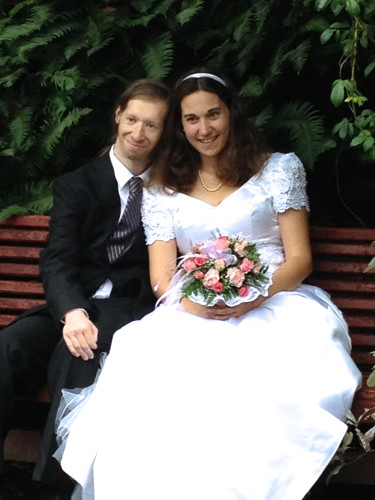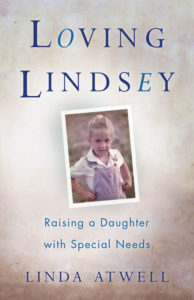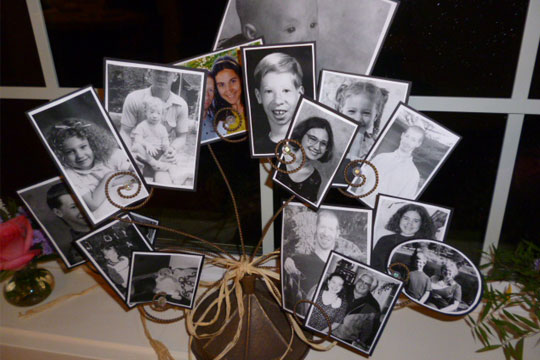
First comes love, then comes marriage, then comes baby in a baby carriage.
That is the rhyme I recited as a little girl. I used these words in my neighborhood and on the playground, taunting friend and foe. I grew up believing that life happened in this order.
But what if the couple that falls in love and marries is special needs? Can they procreate? Should they?
The answer to the first question is yes, many special needs couples have the physiological capabilities to make babies.
The answer to the second question isn’t so easy.
My daughter married her long-time boyfriend two weeks ago. I’d jump over the moon (and back) if the next verse of that rhyme could realistically unfold and Lindsey could conceive a baby. Every woman I know who has been granted grandma status, says, “Being a grandmother is the greatest gift ever!”

At Lindsey and Nick’s wedding, we displayed baby pictures of the bride and groom. Both infants sported round, bald, heads with gummy grins. It stands to reason that this newly united duo would produce an adorable, bald, rounded-headed clone. I’ve overheard their conversations about babies and how they’d love to have a little boy, or a little girl. But truthfully, could they properly care for an infant, a toddler, a child?
Years ago, sometime after Lindsey was diagnosed as mildly mentally challenged, I read an article that surprised me. Unless my daughter’s disability was the result of a genetic abnormality, it was likely she would deliver a mentally healthy child. Doctors didn’t believe that her diagnosis–unidentifiable syndrome–fell into the abnormal genetic category.
In the 2001 movie, I Am Sam, a mentally challenged man fathered a healthy baby girl, but lost custody when she was seven. Sam fiercely loved his child. But love was never the question. The concern was whether or not he could properly care for her. At seven, she had already outpaced many of her father’s mental capabilities. Ultimately, Sam finds a way (due to friends and supporters) to be the dad in his daughter’s life.
Rachel Randolph of The National Resource Center For Foster Care and Permanency Planning created an information packet: Parents with Mental Retardation and Their Children.
Children of parents with intellectual disabilities are at-risk for developmental delay, psychosocial retardation, and behavior disorders (Feldman, 1998;Feldman& Walton-Allen, 1997; Garber, 1988; Gillberg & Geijer-Karlsson, 1983; Reed & Reed, 1965).
In other words, mentally healthy offspring born from mentally challenged parents would be more likely to suffer from environmental disabilities than intellectual ones. Many mentally challenged parents don’t have enough knowledge or skills to stimulate their children so they will flourish.
Randolph’s report stated that children of special needs parents have suffered from the following: (a) untreated diaper rash; (b) malnourishment (due to improper feeding techniques, formula preparation, and/or nutrition; and (c) gastrointestinal infections (due to poor or absent baby bottle cleaning and sterilization techniques). And these are only a few of the complications that could occur in the first months of a baby’s life.
My thirty-two year old daughter has essential tremors. Her hands, arms, and head shake. This hinders many aspects of her world: she has difficulty coordinating a knife and fork to cut meat; she prefers to drink all liquids from a straw; her written correspondence looks like a preschooler’s. Twelve years ago, when I first broached the possibilities of motherhood with Lindsey, she said, “I could love a baby, but I might drop it.”
I worried about that too. But I also feared Lindsey’s limited reasoning abilities might prevent her from properly caring for a child. Randolph’s report confirmed my concerns:
The children are endangered when, for example, the parents do not know how to hold or bathe the child safely, make the home environment safe, provide emergency first aid, or when to take the child for medical treatment…
Just like I Am Sam, many parents in these case studies struggled to keep their children. Some lost custody for temporary periods; others, the separation became permanent–a heartbreaking outcome for all involved.
According to Randolph, although most of the children of parents with mental retardation were born of normal intelligence, the kids were being raised by parents who were unable to read to them, who couldn’t drive them anywhere, and who often lived in a state of poverty. In many cases the parental/child roles reversed and the child began bossing the parents, taking on tasks and responsibilities the adult could not handle.
So we were very concerned when Lindsey experimented with sex at nineteen. (Please refer to my blog, Yikes! My Special Needs Daughter Had Sex). Besides the possibility of contracting a sexually transmitted disease, our greatest concern was: pregnancy. John and I wanted to be grandparents (someday), but we didn’t want to raise our daughter’s child. We understood Lindsey’s limitations. Wouldn’t it be morally wrong to encourage her to have a child?
We sat Lindsey down and discussed the pros and cons of having a baby. Birth control options were addressed before narrowing the conversation to a more permanent possibility: tying her fallopian tubes.* Lindsey didn’t get pregnant. And the following month, she elected to move forward with a tubal ligation. She discussed the decision with her doctor. He agreed to preform the surgery, but recommended she not discuss it with anyone outside our immediate family.
In 1999 (like now), sterilization of mentally challenged adults was a sensitive topic. Advocates could be found on both sides of this issue. Although some organizations supported Lindsey’s choice, other groups supported and encouraged mentally challenged adults to have children (if they so desired). Her doctor warned, “Someone could make things difficult.”
I couldn’t believe an organization might interfere in our daughter’s life, our lives and try to prevent her from making this decision. Then a long forgotten conversation I’d had with my mother resurfaced. Her cousin had delivered intellectually-disabled twin daughters. Years ago, when they became sexually active, the parents tried to have the girls sterilized. Activists intervened and the parents were forced to hire an attorney before the tubal ligations could take place.
I wondered if these advocates would be there in the middle of the night when my daughter needed help calming her screaming baby? Would they help change diapers, see to it that the child was fed properly? Would they make sure the tot received proper medical attention? When the toddler grew into a student, would they help this child with his/her math? And who would pay for all this support?
In our case, Lindsey’s surgery went as planned; no protestors showed up at the hospital. And years later, we learned Nick had also made the decision not to have children and had a vasectomy.
The rhyme I chanted as a child: first comes love, then comes marriage–won’t go any further for Lindsey and Nick. They won’t be the parents of a cute, cuddly, bald-headed infant, smelling of baby powder. They won’t be pushing a baby carriage down the sidewalks of our town. Sometimes, my heart aches and I feel deep grief, knowing Lindsey will never experience motherhood–and I won’t be blessed with grandchildren from her. (I may still have an opportunity to be a grandma if my son and his wife decide to have babies.) Yet I know this was the right decision for her. Procreation wouldn’t have been fair to this couple–or their child.
Some parents and/or advocates may stand against me on this issue. They may shake their fists and fight for their special needs adult to bear babies. They may feel it is within their child’s human rights. They may believe their mentally challenged adult could learn enough parenting skills to be successful. And these parents might be spot-on. I’m not promoting forced sterilization for the mentally challenged, but shouldn’t the rights of an innocent, vulnerable baby be taken into consideration, too? Shouldn’t the emotional growth and safety of an inquisitive toddler be encouraged and protected? And as the child ages, doesn’t he/she have the right not to be environmentally handicapped because his/her mentally challenged parents wanted a baby?
There is no easy answer to this situation. Once a young man or woman begins to engage in sexual activities, it is unlikely a parent (or anyone else) will convince them to stop. We can’t lock our adult children in their rooms or be with them twenty-four hours a day. Sterilization may be a realistic option for some intellectually challenged individuals. Others may consider this option to be offensive. I wish Lindsey (and Nick) never had to make these difficult decisions. But I’m thankful these two high-functioning young adults were courageous enough to choose to be responsible.
 My first book, Loving Lindsey: Raising a Daughter with Special Needs will be out September 26, 2017. If you would like to learn more, click here.
My first book, Loving Lindsey: Raising a Daughter with Special Needs will be out September 26, 2017. If you would like to learn more, click here.

